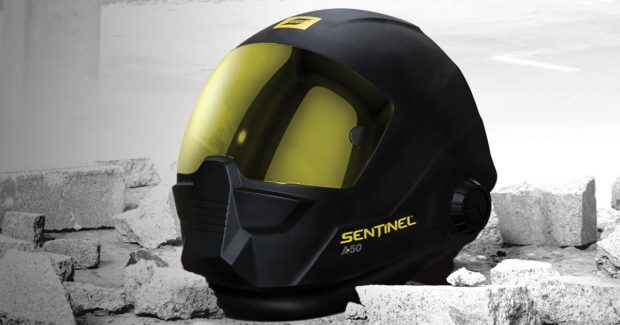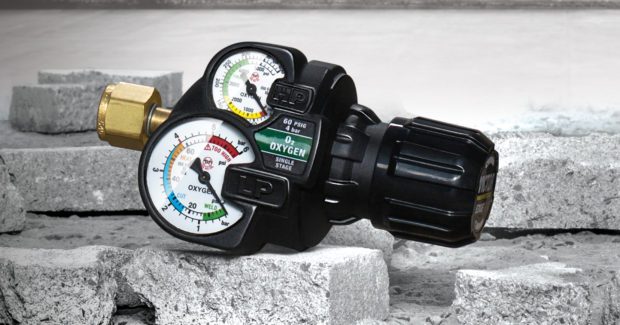Automatic Welding Helmet Increases Operator Comfort and Productivity
The Sentinel A50 automatic welding helmet from ESAB features Halo headgear and an ergonomic, low-profile design for improved weight distribution with five contact points.
Posted: February 24, 2017
ESAB Welding & Cutting Products (Florence, SC) has unveiled their Sentinel™ A50 high performance automatic welding helmet with a radical new design that incorporates ergonomic headgear and maximum adjustability to increase productivity, functionality and usability. This helmet’s high-tech features include an infinitely adjustable 5-point headgear, a 100 mm x 60 mm viewing area, an externally activated Grind Button, a color touch screen control panel and a front-loading convex cover lens that comes in different color options and changes in ten seconds. “The technology involved mirrors the technology we use every day, such as on our smart phones,” says Guy Shelverton, a global product manager at ESAB. “Operators can now use this technology to make their lives easier and more productive in the workplace.”
Operators will immediately notice greater comfort from the helmet’s Halo™ adjustable 5-point headgear. The ergonomic, low-profile design delivers improved weight distribution with five contact points, including a central pivot point that allows maximum head clearance while the helmet is in the up position. The additional contact points introduce approximately 500,000 different combinations of headgear settings, five times more than standard helmets typically provide. In addition to the enhanced headgear, the Sentinel A50 features an advanced high optical class ADF lens with a 100 mm x 60 mm viewing area for wider visibility and better spatial awareness. With its 1/1/1/2 optical class rating, welders can be assured that the helmet offers a sharp, clear and consistent view of the weld puddle. True color technology enables operators to obtain a better view of the weld puddle and surrounding area, helping the operator keep the weld puddle centered in the joint.
For grinding, a grind application mode is activated externally on the shell’s temple, so operators don’t have to remove the helmet when shifting from welding to grinding. The grind mode is easily accessed, as well as deactivated, by holding the button for two seconds. With an external grind mode button, operators minimize downtime by quickly switching applications without having to access an internal switch on the control panel. The Sentinel A50 features a convex front-loading cover lens that not only prevents the buildup of spatter, but also can be easily removed and replaced. The cover lens, as the chief consumable on a welding helmet, takes the most abuse during welding; consistent spatter, sparks and heat create wear and tear on the lens and prevent proper viewing. The spherical quick-release cover lens contains two switches – one fixed, one push-button – for one-click removal. Replacement can be achieved in ten seconds, minimizing any time spent changing parts. The spherical shape of the cover lens also reduces the small recesses and gaps where spatter collects and penetrates, particularly in overhead welding. An anti-scratch coating reduces the reflection from high exposure to spatter and sparks.
Operators will appreciate the helmet’s full touchscreen with color backlit display that makes it easy to read in low-light environments. The helmet’s interface is sharp, intuitive and accessed with only one button. The simple interface design permits operators to pick up the helmet, turn on the screen and activate everything without requiring a user manual. The helmet’s digital lens technology also gives the welder full control to adjust shade (5 to 13) and sensitivity. The interface contains eight memory settings with precision for any application or process. The Sentinel A50 weighs 28 oz and features a high impact resistant nylon shell. With an MSRP of $250 to $300, this welding helmet has the best combination of performance features and price.
ESAB has also unveiled the Victor® EDGE ESS42, the second generation of its heavy duty, high capacity single-stage cylinder regulators that features a new modular gauge design with an extra-large 2½ in delivery gauge and an offset, smaller gauge for cylinder pressure. High-contrast, color-coded gauge faces enable users to more easily see and set cylinder pressure. “Our Voice of Customer feedback program indicated that users want a bigger gauge that’s easier to see and a smaller gauge that’s highly protected. Essentially, they wanted a bigger smaller gauge,” says John Henderson, the director of product development for global gas equipment at ESAB. “The EDGE ESS42 accomplishes these seemingly contradictory goals. Users can instantly differentiate between the high and low pressure gauges and, from a distance, determine if they have sufficient gas in the cylinder and have set delivery pressure in the appropriate range.”
To further mistake-proof the EDGE ESS42, Victor molded “HP” and “LP” into the bonnet by the high and low pressure gauges. Additional improvements include more clearance for wrenches between the cylinder valve and regulator body, a more comfortable grip on the pressure adjustment knob and a stainless steel diaphragm with improved flex to deliver consistent pressure and flow over a wide range of cylinder pressures. The EDGE ESS42 continues to deliver uncompromised safety with features such as SLAM™ (Shock Limitation and Absorption Mechanism) technology built into the adjusting knob, permitting the knob to absorb the impact in the event of a cylinder fall. As with the previous version, the compact body design positions the gauges and other critical elements of the regulator so that they stay within the profile of many cylinders, enabling the cylinder to help shield the components from impact.
The regulator, designed to pass ASTM G-175 promoted ignition test, also features a high-strength alloy gauge guard and has a high-resistance to oxygen related fires. Victor will introduce EDGE ESS42 models for all popular gases in 2017, including oxygen, argon, air, acetylene, LP, carbon dioxide and nitrous oxide.
ESAB also offers their downloadable Welding Filler Metal Databook to help boost productivity and improve weld quality. This handbook provides information, such as recommended parameter settings, deposition rates, mechanical properties and chemical composition, on their full line of filler metals. The downloadable eBook provides a fast-flip format and intuitive “quick select” Table of Contents that ensures filler metal information and technical specifications are easy to locate. The handbook also contains filler metal calculations and recommendations for welding ASTM steels. To download your free Welding Filler Metal Databook online please click here. Printed copies are available for order on ESAB’s Product Support page.
ESAB Welding & Cutting Products, PO Box 100545, 411 South Ebenezer Road, Florence, SC 29501, 843-669-4411, Fax: 843-664-4258, www.esabna.com.















